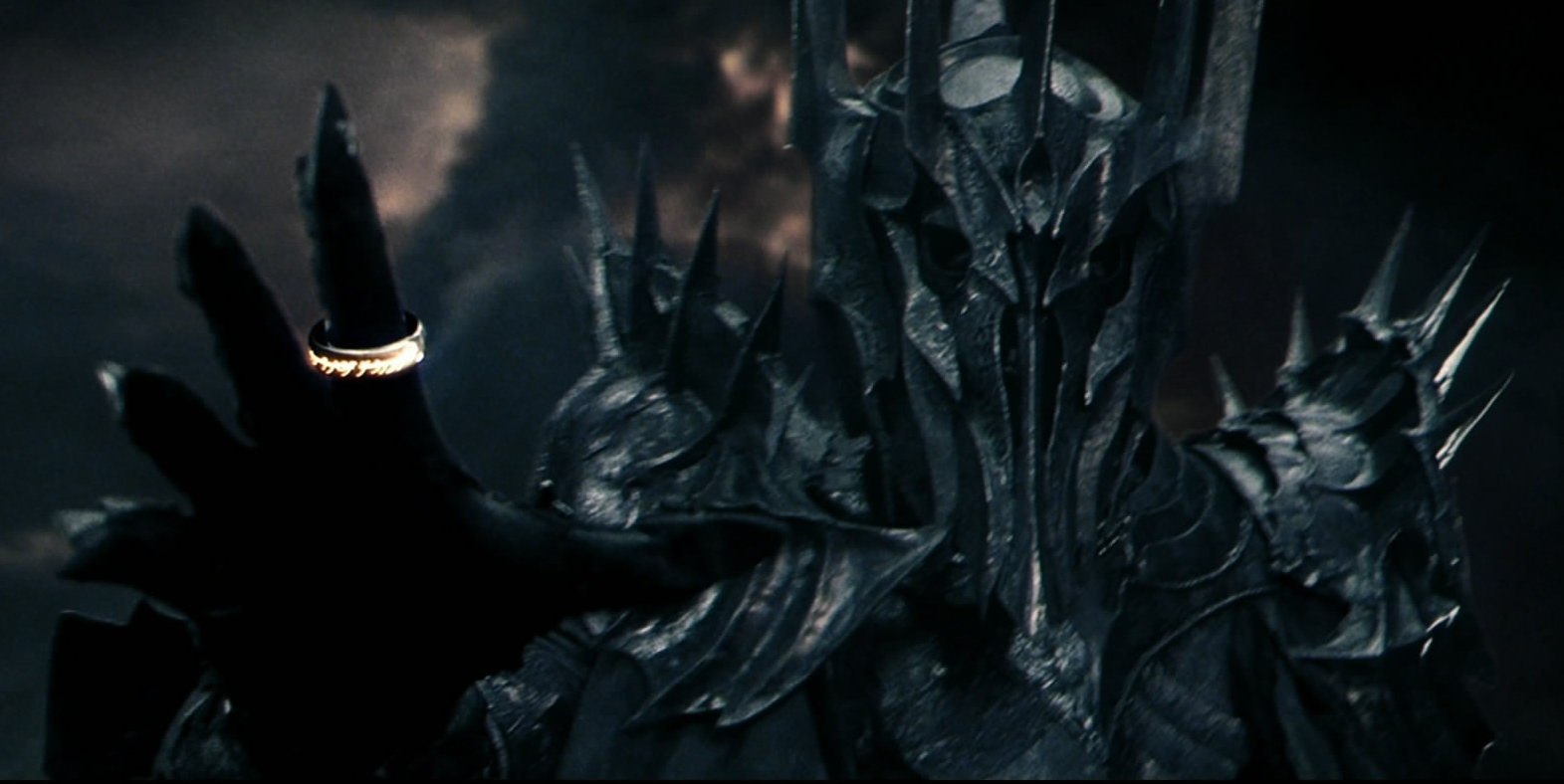Tolkien Tuesday: Sauron, Lord of Assumptions
There's nothing like a good villain.
Sometimes, they are the most memorable part of a story. I think of things like The Dark Knight. The Joker was such an impactful presence that we already have multiple actors playing other iterations.
The Arkham video games don't stray from making sure he's in every plot twist one way or another. Once you find a good villain, you stick with it.
Oh don’t even get me started
Tolkien's world is filled with some pretty fantastic villains.
There's Saruman, the leader of the five wizards that came to Middle Earth to help the free peoples against the darkness. Turns out he lied on his resume.
I'll definitely be doing a post on him because the chapter, “The Voice of Saruman,” just might be one of the best chapters in the entire series, fight me.
Of course, you have the big fiery demon bros that love a good long nap. The Balrog's evil lies in getting the fan base to debate on whether they have wings or not.
Seriously though, it's hard not to be entranced by the visual beauty and terror of Gandalf facing off against this thing in Fellowship of the Ring.
In the books, Gandalf is exhausted from his spells being broken, seemingly at no cost to the Balrog, who just keeps hunting them through the darkness.
The magic here explains why Gandalf doesn't just blast orcs with lightning all the time too, but that's also another post.
There goes the last mana potion…
I won't pretend to be knowledgeable about all the evil in The Silmarillion.
Everything that happens there essentially sets up our old pal Sauron to be the biggest baddest evil still left in Middle Earth.
He subjugates terrible orcs to his will, desolates nature wherever he goes, and corrupts the hearts of men, all from the comfort of his evil living room. (He has great wifi).
Tolkien starts setting up the looming darkness of Sauron back in The Hobbit. There isn't much detail about the oft-spoken of, but little-seen Necromancer from the story, but it's well established it takes the most badass elves and wizards to get stoop kid to leave his stoop.
The evil influence that the Necromancer has over the forest of Mirkwood lessens, and he flees to his way cooler tower in Mordor.
It's not long after that Sauron starts a war with Gondor, revealing he has officially returned. Gondor valiantly takes him head-on, only to be beaten back at every turn. One loss after another and Sauron slowly forces his way closer and closer to the white city of Minas Tirith.
Meanwhile, people are pretty sure they are never going to see a King sit on the throne in Minas Tirith, and the elves are leaving Middle Earth like the quiet guy at a party that really doesn't want to be there.
K byeeeeee
Hope is fading fast.
Sauron is this terrible evil that, from the very start of The Fellowship of the Ring, makes even Gandalf hesitate before saying his name. The Ringwraith servants he has hunting Frodo–in over his head–Baggins, create fear just by being nearby. Kind of like Juggalos.
One would think Tolkien has established an unbeatable character. Sauron is in his heavily fortified keep in a land you simply can't walk into. Orcs and his other servants are anywhere and everywhere. The villain of all villains.
How can you beat this guy?
Let him mess it all up on his own.
Villains have flaws too, and it's important to remember that.
It's easy, for me especially, to try and think of antagonists that are so good at being terrible people that they have no weakness. I don't want to be that writer that everyone points out just how easy it was for the heroes to overcome this bad guy because he had glaringly obvious weaknesses.
So how do you establish a good weakness in an enemy of your own fellowship?
Well, what is the villain's greatest strength? There you go, it's also their biggest weakness.
Tolkien knew this too, and Sauron does a pretty fantastic job at messing up his own plans and missing critical opportunities. For all his might, Sauron falls to his own choices, guesswork, and over planning. Sometimes, this is utilized by the good guys, and other times, Gandalf even admits just how lucky they get.
Ok…luck will help me remember right?
There's plenty of examples in literature of pride coming before the fall. Overconfidence is the downfall of bad guy after bad guy. Part of the required classes for Antagonist University is monologuing.
Tolkien, though, takes that a step deeper and it's only after multiple reads and, as I mentioned in previous posts my desire to figure out why Tolkien split up the books the way he did, that I see something in the patchwork.
In The Two Towers, Tolkien decides to show us what everyone else is doing for the first half of the book, then cut to Frodo and Sam for the entirety of the second half.
This seems odd to me, and some pacing issues arise out of it. How he pulled off having Helms Deep happen in the first quarter of the book, is kind of crazy.
But, I'm starting to see why.
Again, Tolkien doesn't focus on the big battles and swordplay, that's not where a lot of the conflict is coming from in the books. The looming threat of Sauron is everything, and the secrecy of the Ring is the good guys only hope.
It's fate and timing that helps the free peoples more than anything. This also adds to Sauron's decision making, he still gets to be the big bad guy who is terrifyingly close to finding the Ring at all times, while still making mistakes that actually make sense.
Way back in The Fellowship of the Ring, Gandalf decides to choose good hearts and friendship to join their company, justifying his choice for Merry and Pippen to come along. This seems foolish at first, but a domino effect of good things happen because of it.
Pictured: Two good good boys
First, Pippen seems to have alerted the Moria orcs and one previously mentioned Balrog that there was a very important group of people trying to sneak through their hometown.
This causes Gandalf to face off with the Balrog, falling to a three-day fight and kind of death. The group loses their leader, forcing people to make the decisions I talk about in my first Tolkien Tuesday article.
Ultimately, this allows Gandalf to come back stronger and help Rohan instead of going with Frodo to Mordor.
Second, Merry and Pippen get captured by Uruk-hai. Not a great experience, but they eventually escape into Fangorn forest, accidentally rallying the trees to fight Saruman.
This eliminates the corrupt wizard from the playing field, more or less. It's this moment that has even deeper meaning, though.
Sauron is so powerful he is playing Saruman like a fiddle. The wizard thinks he is going to be able to get his hands on the Ring first and overthrow the Dark Lord, taking the mantle for himself.
Nah.
Instead, Saruman is trapped inside his own tower, (boy, bad guys love their towers in Middle Earth), and is useless to everyone, including Sauron.
The Dark Lord starts getting pissed as to why his wizard puppet hasn't responded to his texts and sends a Nazgul to investigate. Before the dark messenger can get there, Pippen does classic Pippen and makes a mess.
A good mess.
When you roll a 1 on a stealth check
You see, Pippen looks into a Palantir that Saruman has that communicates with Sauron. (Why Tolkien are those names so similar my dude?).
Sauron then makes big assumptions, but ones that make sense. He thinks that Saruman has captured the Hobbit that has the Ring and now has taken it for himself.
Sauron doesn't wait for his messenger to get back with detailed news, nor does he ask more questions of Pippen who is essentially at his mercy. Nazgul go rushing out of Mordor in force to take down this puppet who is about to start pulling the strings, in Sauron's eyes at least.
We only know the reaction of Sauron from later in the book when we are with Frodo and Sam. They are trying to make their way across the marshes and desolate waste in front of the front gate of Mordor. They should be seen by the Nazgul that are flying around purposefully watching for something like this.
If you line up the dates though, this is about the time when Sauron thinks that Saruman has the Ring. Frodo and Sam believe they have been spotted when at least four flying Ringwraiths are seen overhead, only to keep going westward.
What's west? Saruman.
Fate and luck save Frodo from being seen. Sauron is too busy assuming Saruman has the Ring and stops paying attention to his front door right when his own doom is standing on his doormat.
Ironically, Sauron’s doormat
It's the little details that make a great story. The tapestry of good vs. evil should be a complex one.
Sure, the story is about destroying this one thing that saves everyone. That can be a little simple, some might call it lazy writing. Then you see how elaborate the journey is and realize it's not so much the destination, but the path to get there.
A villain needs weaknesses, the good guys need to exploit it. (They later use the Palantir to do just that because Aragorn is a badass...now there's a post!)
The details you put into these weaknesses play into the plot, and that can make all the difference. Your enemy could be the cliché big bad guy that has been in so many stories, but the details of their downfall could be what make them unique.
The more elaborate the villain, the more complex the downfall. And it makes things a hell of a lot of fun to read over and over again.
There’s plenty more Tolkien to gush over (that will also help you be a better writer). Sign up for my geeky newsletter below:
















